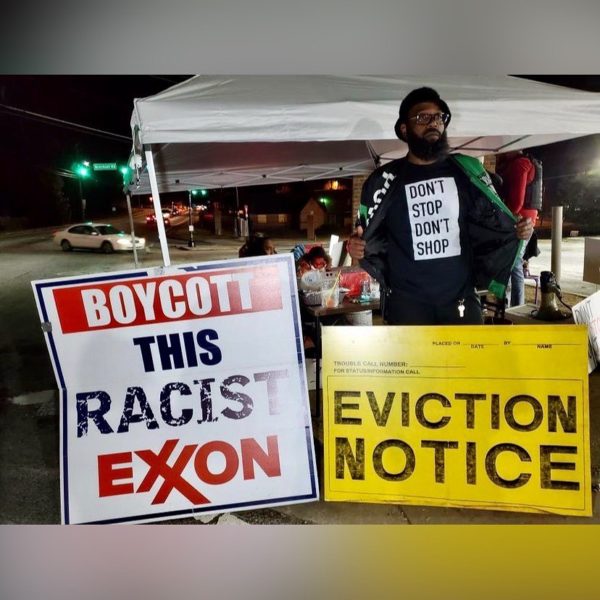Atlanta Man Mounts Boycott of Local Gas Station Following Employee’s Racist Remark; Owner Capitulates, Agrees to Sell Business to Black Owner
It all started with one man’s mission to bring respect to his community.
Joe Jones, a 36-year-old East Atlanta native, began demonstrating outside an Exxon gas station-convenience store in his neighborhood midway through October. He was outraged when he saw video on social media of one of the store’s cashiers telling a customer, “I don’t give a f–k about the Black neighborhood.”
Jones was alone when he began standing outside the Gresham Park business on the outskirts of East Atlanta for hours each day, discouraging patrons in the predominantly Black neighborhood from shopping there.
All he had was a chair, a tent he borrowed from his parents and a desire for change.
“It wasn’t an isolated incident,” Jones told Atlanta Black Star. “There was a history. This was a result of years of abuse.”
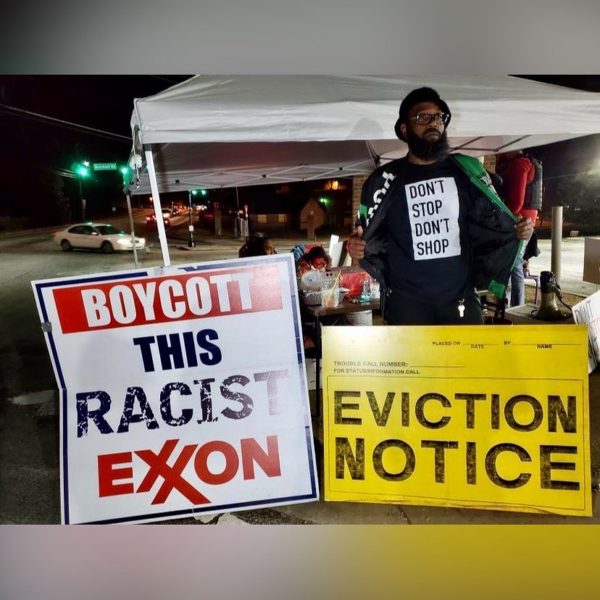
Rahim Sivji, the gas station’s owner, laughed at Jones the first couple days he staged outside, customers told him.
But every day, more demonstrators gathered alongside him, more cars blew their horns in support and more would-be customers chose to get their gas elsewhere.
On the sixth day, Sivji offered Jones $1,000 just to pack up and leave. But Jones remained. His calls for a boycott soon transformed into a grassroots movement that galvanized the entire Gresham Park-East Atlanta community.
Sales at the Exxon, stationed at the corner of Flat Shoals and Gresham roads, plummeted at between 70 percent and 80 percent over the two months that followed, Sivji told CBS 46.
On Dec. 21, after 66 consecutive days of protest, the owner signed a memorandum of understanding pledging to immediately put his gas station on the market. As part of the agreement, Sivji offered Jones an option to buy the business himself. In return, Jones agreed to end his daily demonstrations while the gas station is up for sale.
Jones said he hopes the boycott lays a blueprint that can be used in Black communities nationwide.
“People from the neighborhood got together and we impacted his business by 70 percent,” he said. “We were able to take away 70 percent of his of his revenue. And that’s the power that we have. Just think about that on a massive level.”
‘Foodstamp cockroach’
Sivji indicated he’s owned the Exxon at 2345 Flat Shoals Road for the past 23 years.
Jones grew up in the East Atlanta neighborhood near the gas station, and said it sat in the middle of a food desert before Walmart set up shop next door a few years ago.
Jones was sitting on his couch scrolling through Instagram on Oct. 10 when he saw the now-infamous video. One of the store’s clerks, identified simply as Jimmy, was standing behind a bulletproof glass partition demanding that a customer leave the store. As Jimmy and the customer argued, the cashier could be heard stating he didn’t care about the Black community.
“Everybody from this area was familiar with the store,” Jones said. “We’ve all been going to the store since we were kids, basically. So we know how nasty their attitude is, we know how nasty their disposition is. We know how nasty the store is physically, just in general.”
Jones shared the video on his page and went to the gas station the same day. He stood outside and began showing the clip to customers, telling them this was how the store’s ownership felt about them.
Sivji came out and shooed Jones away, calling him a “food stamp cockroach” and telling him to “hurry home before your unemployment runs out,” Jones claimed. The owner then called the police and had Jones trespassed from the property.
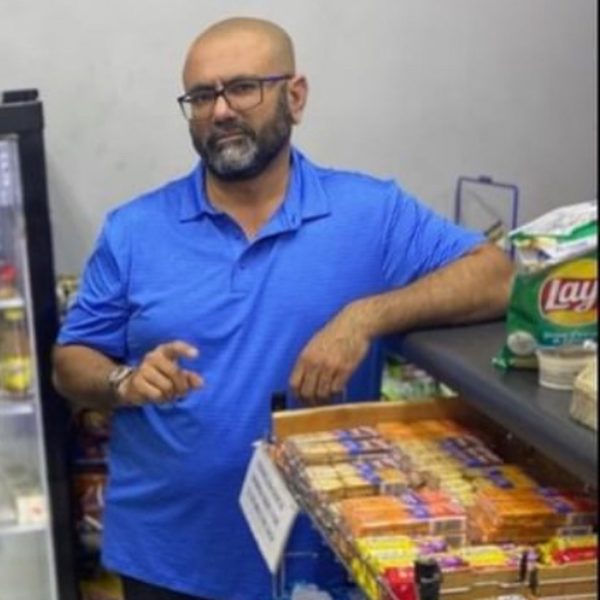
Jones did go home. He took to his Instagram page to tell his followers to stop shopping at the gas station. He then began preparing for his protest.
“This is OUR neighborhood y’all,” he wrote. “I learned to drive in that Walmart parking lot after it was Kmart. The only reason they can AFFORD to be so disrespectful and arrogantly racist is because WE pay them. 90% of their business is from BLACK PEOPLE. They do us this way because we allow it.”
The boycott officially began Oct. 13. From then on, Jones picketed outside through rain, sleet, sun and snow, eight to 10 hours each day. He admits the first few days were tough and said his initial goal was just to bring awareness to the situation. He showed the video to as many customers as he could.
But while he was posted on the corner, some people from the neighborhood began sharing their own personal horror stories with him. One man said he saw the owner come out on a cold night and dump a bucket of water on a homeless man sitting outside the store. Another man said a cashier called him a “stupid Black monkey” simply because his debit card wasn’t working properly during a transaction.
Customers complained about dirty bathrooms and unsanitary conditions in the store, while others said they’d been overcharged on purchases. Several shared instances when the owner and other store clerks called Black customers the N-word.
“This gas station is probably the most unprofessional, racist convenience store that I’ve seen in the city of Atlanta,” said one man who identified himself as Boson. “I would tell anybody that this gas station, you definitely want to bypass. Because they do not appreciate Black people, and they don’t appreciate the Black dollar.”
Jones said he was most troubled by testimony from Black women who shared tales of the store clerks calling them “Black b—ches.” With that, Jones became determined to bring the shop to its knees.
“After hearing so many stories, I just decided man, these guys aren’t allowed to make money over here,” he said. “That’s just it. We have to stick together and just make sure that people aren’t able to benefit off of us without a concern for our well being. Or at the very least, respect. There should be some gratitude associated with the money that we spend, but respect should be the minimum.”
Jones began staging special events every Friday to get the community excited about the protest. He invited local disc jockeys DJ Such N Such and DJ Krunch to play music and energize the throng of picketers.
“It turned into a celebration. After the first one, it was like, ‘you don’t want to miss the second one,’” he said. “I wanted this to be about us as a people and us as our community. And I wanted to clearly communicate to our people, ‘Man, look, there’s nothing lame about coming out here and standing up for your community. It’s nothing lame about not letting them disrespect our elders. So I tried to make it as hip as I could with the celebration every Friday. And that just kind of took it to the next level.”
In taking it to the next level, the community did it their own way, proclaiming “this ain’t your average grand daddy’s boycott; this is a 2020 Zone 6 boycott.”
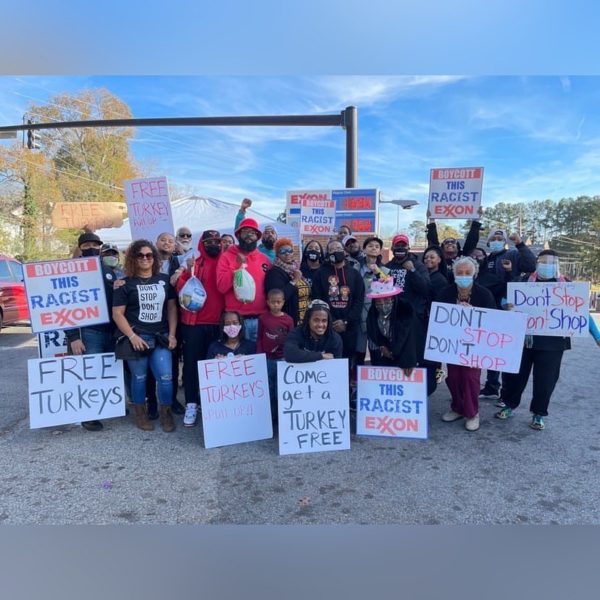
With the momentum, Jones started getting support from across the city, and word of his protest spread far and wide on Instagram. Famous entertainers like T.I., D.L. Hughley and the comedian Earthquake lent their support on social media. He got messages and well-wishes from the United Kingdom and Germany.
Dr. Meredith Minor, an East Atlanta native who now lives in Alabama, was so inspired that she moved back to her mother’s house for two moths to become an instrumental part of the movement.
A friend who owns a print shop custom-made a sign so motorists driving by could clearly see the protestors’ message. Other supporters donated a bullhorn, tables, coolers, a couch and a Bluetooth speaker so Jones could amplify the infamous video into the gas station parking lot.
“Even though I spearheaded this initiative, and I appreciate the praise, I think it’s important to note that the secret weapon is the unity,” Jones said, calling it a collaborative effort. “This isn’t possible with all of our cooperation, not just the people standing on the corner. But everybody that chose to ride right past that gas station.”
Sivji apologized and fired the clerk, according to CBS 46. But after the TV crews were long gone, customers spotted the cashier behind the counter again, ringing up orders in a medical facemask.
Sivji described Jones’ protest and boycott as “harassment,” seeming to suggest the demonstration was threatening his life.
“They tried to put me out of business,” Sivji told the TV station. “It got to the point where I’m thinking if I have to save my life or my store, I say the hell with my store, I want to save my life. That’s what’s important to me.”
Jones chronicled much of the boycott on his Instagram page. It showed several inspectors from the county code enforcement office descend upon the gas station in November.
Trouble, an Atlanta rapper, helped demonstrators hand out hundreds of turkeys the Tuesday before Thanksgiving. The week before that, Jones and company gave out more than 1,000 free boxes of fresh produce.
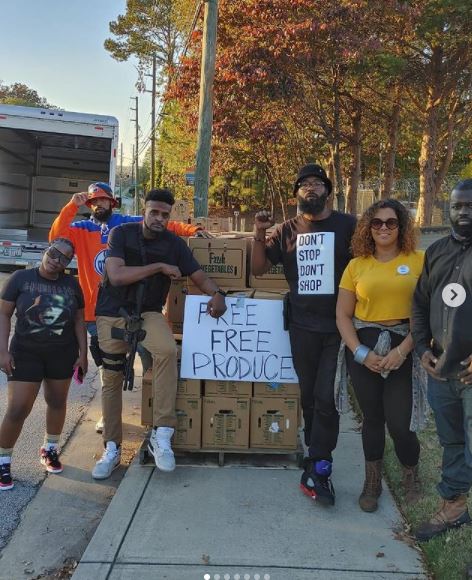
Now the group has started a GoFundMe crowdfunding campaign with the goal of raising $5 million to buy the business and renovate the property.
Jones said he’s been working with Sivji’s realtor and trying to structure a platform for accredited and non-accredited investors to help bankroll the purchase.
“So that the community can have a chance to own a piece of this store and have some equity in this deal too,” he said. “Because that’s the spirit of this movement. If we can structure this in a way where the community can buy in, that’s my goal, ultimately.”

